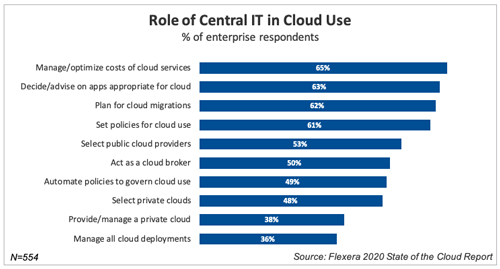News
Public Cloud Regularly Runs Orgs over $1 Million Per Year
- By Kurt Mackie
- April 28, 2020
A recent survey of 750 enterprises and small-to-medium businesses (SMBs) indicates robust spending on public cloud services, with a strong reliance on multicloud and hybrid cloud approaches.
Flexera's "2020 State of the Cloud Report" found the majority of respondents (63 percent) spent "$1.2 million or more per year" on public cloud services, while 26 percent spent "at least 12 million" per year. Top public cloud providers, per the respondents, included Amazon Web Services (76 percent), Microsoft Azure (63 percent) and Google Cloud (35 percent).
The vast majority (93 percent) have adopted a multicloud strategy, with organizations using an average of 2.2 public clouds and 2.2 private clouds. A similarly high proportion (87 percent) also uses a a "hybrid" cloud approach, which combines public and private cloud infrastructures.
The survey also tracked managed service provider (MSP) use among organizations, indicating solid demand. Nearly half of respondents said they used MSPs for at least "some" or "most" public cloud purposes.
Only about one-third of the respondents used multicloud management tools, or tools for cloud security, governance or cost management functions. Flexera is a Chicago-based provider of IT and asset management solutions, so much of the survey probed those sorts of issues.
The study found that enterprises particularly need centralized IT oversight over cloud operations. Enterprise respondents described those roles, which are shown in the following diagram:
 [Click on image for larger view.] Cloud roles reported by enterprise respondents. (Source: "Flexera 2020 State of the Cloud Report," reproduced per Creative Commons 4.0)
[Click on image for larger view.] Cloud roles reported by enterprise respondents. (Source: "Flexera 2020 State of the Cloud Report," reproduced per Creative Commons 4.0)
Top Cloud Challenges
Respondents indicated that their current cloud spending was over budget by an average of 23 percent. Some cost-saving measures taken by the respondents included using automation to shut down workloads after hours (51 percent) as well as right-sizing instances (49 percent).
Another top cloud migration challenge was "understanding app dependencies," according to 63 percent of respondents. Some other migration challenges listed in the report included "assessing technical feasibility" (47 percent), "assessing on-prem vs. cloud costs" (41 percent) and "rightsizing/selecting best instance" (39 percent).
However, the overall top cloud challenges, per respondents, included security (81 percent), managing cloud spend (79 percent), governance (77 percent) and a perceived "lack of resources/expertise" (77 percent).
Cloud software licensing was deemed to be a fuzzy area in terms of understanding cost implications (56 percent). Other conundrums included following cloud licensing rules (49 percent), understanding cloud licensing complexity (48 percent) and having control over using too many licenses (45 percent).
In terms of the respondents' present-day cloud initiatives, they were mostly seeking to optimize costs associated with cloud use (73 percent), followed by migrating more workloads to the cloud (61 percent), expanding the use of containers (51 percent) and going cloud-first (48 percent).
About the Author
Kurt Mackie is senior news producer for 1105 Media's Converge360 group.